Introduction
As organizations increasingly transition to cloud-based solutions, the significance of robust cloud hosting support has become a pivotal consideration in achieving operational success. With a staggering 89% of businesses embracing multi-cloud strategies, the demand for comprehensive support services that encompass security, performance monitoring, and technical assistance is more pressing than ever. In an environment where downtime and data breaches can have severe financial repercussions, understanding the essential features of cloud hosting support is crucial for organizations aiming to optimize their investments and enhance their resilience.
This article delves into the multifaceted nature of cloud hosting support, exploring its key components, the importance of reliable assistance, and the evolving landscape of cloud services that are shaping the future of business operations.
Defining Cloud Hosting Support: An Overview
Cloud hosting support includes a comprehensive suite of services designed by providers to ensure the seamless operation of cloud-based systems. This encompasses not only technical assistance but also system maintenance, security management, and performance monitoring. As 89% of enterprises now use multi-environment solutions, with 80% of these adopting hybrid strategies, the need for effective cloud hosting support has never been more evident.
Organizations increasingly depend on these services to enhance their infrastructure investments, thereby facilitating the achievement of key business objectives.
Efficient cloud hosting support enables companies to effectively tackle possible challenges such as downtime, data breaches, and performance problems. This ensures that organizations can maintain operational continuity and focus on their core activities without disruption. As mentioned by ReportLinker, "the combined contributions of leading regions represent 82% of global computing," which highlights the significance of strong assistance systems in this rapidly changing environment.
Additionally, as we near 2024, the projected worldwide return on investment (ROI) from digital technologies is anticipated to be a central focus for IT and executive leaders, emphasizing the vital role of cloud hosting support in driving business success.
Moreover, the ongoing digitization of life and the rise of smart devices are propelling an exponential growth in data generation. By 2025, it is estimated that 50% of data will be stored online, with total global data projected to reach an astonishing 200 zettabytes. This increase in data requires efficient cloud hosting support to manage and utilize this influx successfully, ensuring that organizations remain competitive in a data-driven world.
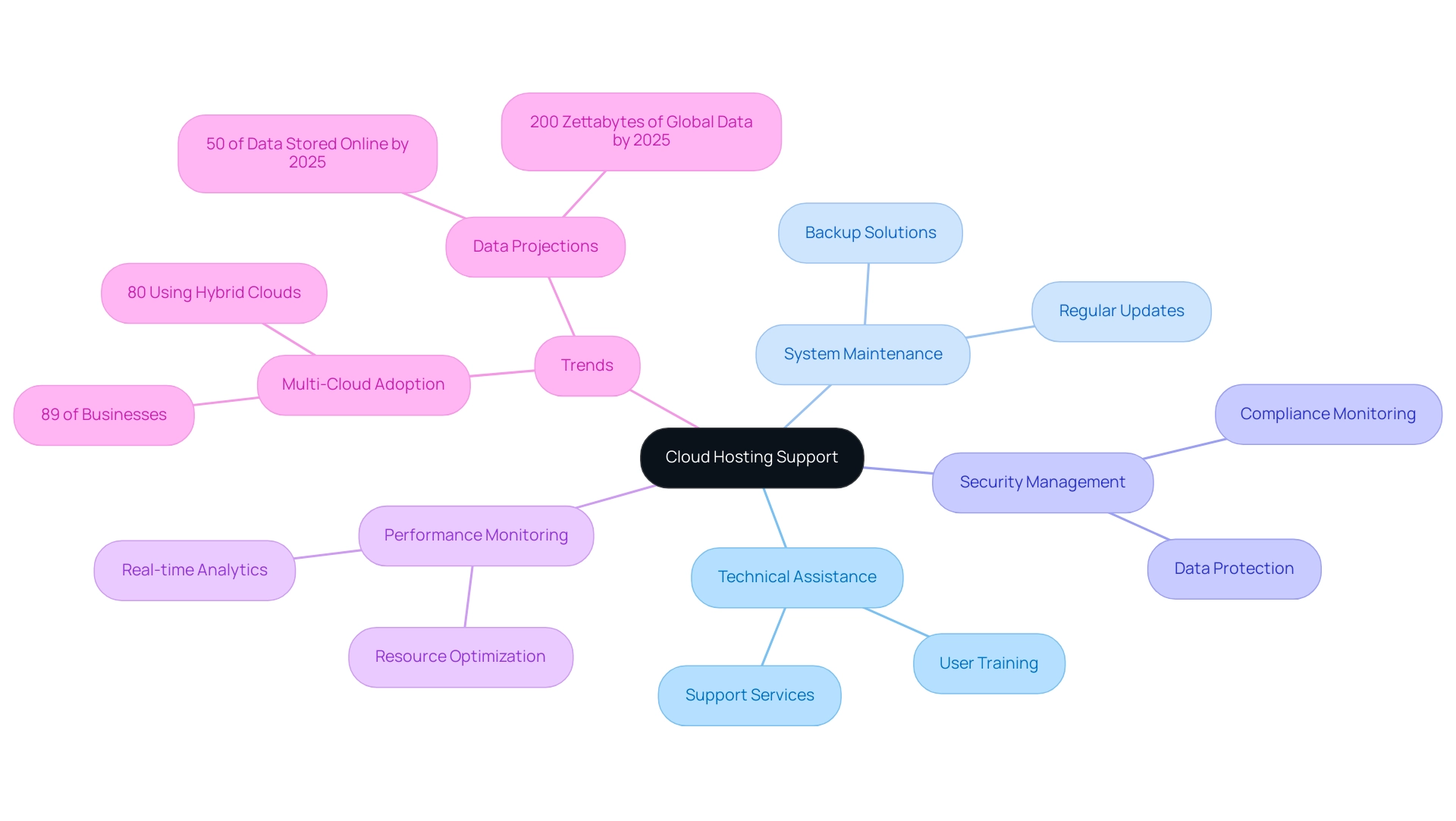
Key Features of Cloud Hosting Support: What to Look For
When evaluating cloud hosting support, organizations must prioritize several essential features:
- Protection: In a time when online data breaches have surpassed on-site data breaches, strong protective measures—including encryption, access controls, and ongoing vulnerability assessments—are essential to safeguarding sensitive information. Phishing is involved in over 25% of cloud protection attacks, underscoring the necessity for advanced safeguards.
Furthermore, 66% of IT protection leaders are currently utilizing or implementing public key infrastructure automation, emphasizing a notable trend towards enhancing protection frameworks. Notable case studies, such as the breach at National Public Data exposing 2.9 billion records and the ransomware attack on Change Healthcare affecting 100 million people, further illustrate the critical need for strong security measures.
-
Scalability: The capacity to dynamically adjust resources in response to demand is crucial for optimizing costs and maintaining performance. As cloud infrastructures evolve, the importance of scalability becomes increasingly highlighted.
-
Performance Monitoring: Implementing continuous performance monitoring systems allows for proactive identification and resolution of potential issues before they adversely affect operations. This feature is vital for ensuring consistent service delivery.
-
Technical Support: Access to knowledgeable support personnel is essential for rapid issue resolution, minimizing downtime, and ensuring operational efficiency.
-
Backup and Recovery: Reliable backup solutions are critical for maintaining data integrity and availability in the event of failures or disasters.
These features collectively improve the resilience of computing infrastructures, enabling businesses to thrive. According to projections, the global internet security software market is expected to expand from $29.5 billion in 2020 to approximately $37 billion by 2026, reflecting the growing recognition of these features in today’s digital environments. Furthermore, as Grace Lau observes, by 2024, 60% of infrastructure and operations leaders will experience public service expense overruns that adversely impact their available budgets, highlighting the urgent requirement for efficient assistance.
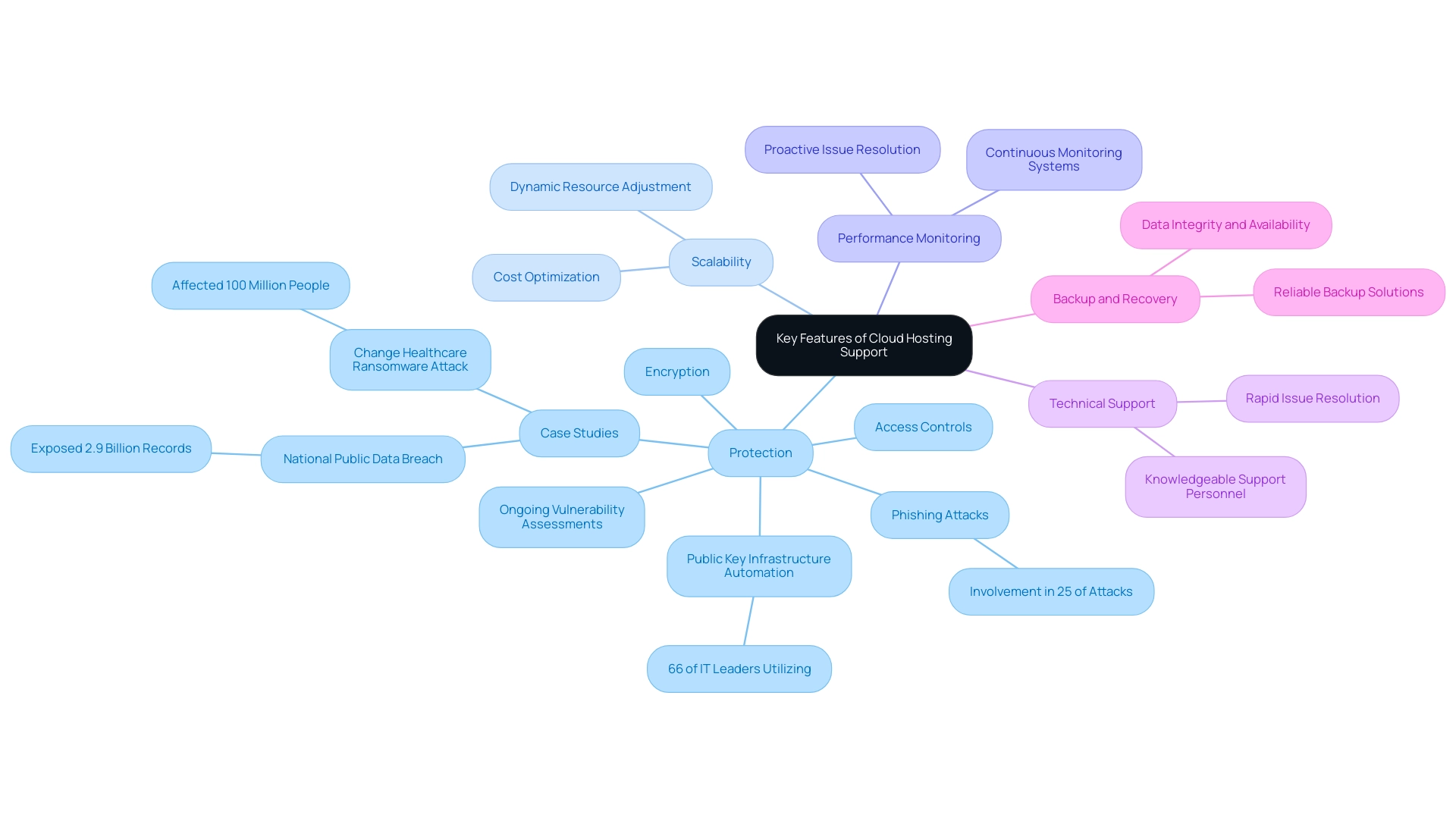
The Importance of Reliable Support in Cloud Hosting
The significance of dependable cloud hosting support in online hosting cannot be emphasized enough, especially in 2024, where operational efficiency is directly linked to business continuity. Downtime is not just an inconvenience; it can result in significant revenue losses and reputational damage. Each minute a service is disrupted translates into financial repercussions, with studies indicating that businesses can lose thousands of dollars per minute of downtime.
This makes cloud hosting support essential for swift issue resolution. A recent survey revealed that half of the businesses migrating to online services cited disaster recovery as their primary motivation, underscoring the need for reliable support mechanisms. Furthermore, industry insights from StormForge highlight that 'most companies reported that as their cloud spend increased, so did their cloud waste,' emphasizing the need for effective management of cloud resources.
Notably, the June 2022 CloudFlare outage, which impacted major players like Discord and DoorDash, serves as a stark reminder of how outages can affect even the largest organizations. Clients have consistently commended STS Consulting Group for their exceptional assistance, with one stating, 'I was really impressed with the way STS Consulting Group handled everything.' From the first conversation to everything in between, they were very helpful and knowledgeable.
Another remarked, 'STS Consulting Group was the missing piece to my puzzle. From start to finish, they solved every problem and helped us achieve our goals in the most professional way possible.' Additionally, a client noted, 'Thanks to STS Consulting Group's cloud hosting support, we were able to enhance our disaster recovery plan, ensuring minimal downtime during critical updates.'
Establishing a solid partnership with a trusted ITaaS vendor is crucial, as infrastructure leaders emphasize the importance of selecting partners based on expertise in hybrid and multicloud strategies rather than just pricing. This strategic alignment not only facilitates faster innovation but also ensures seamless integration of technological solutions. Ultimately, organizations that prioritize cloud hosting support are better equipped to navigate the evolving technology landscape, minimize downtime, and enhance their overall performance.
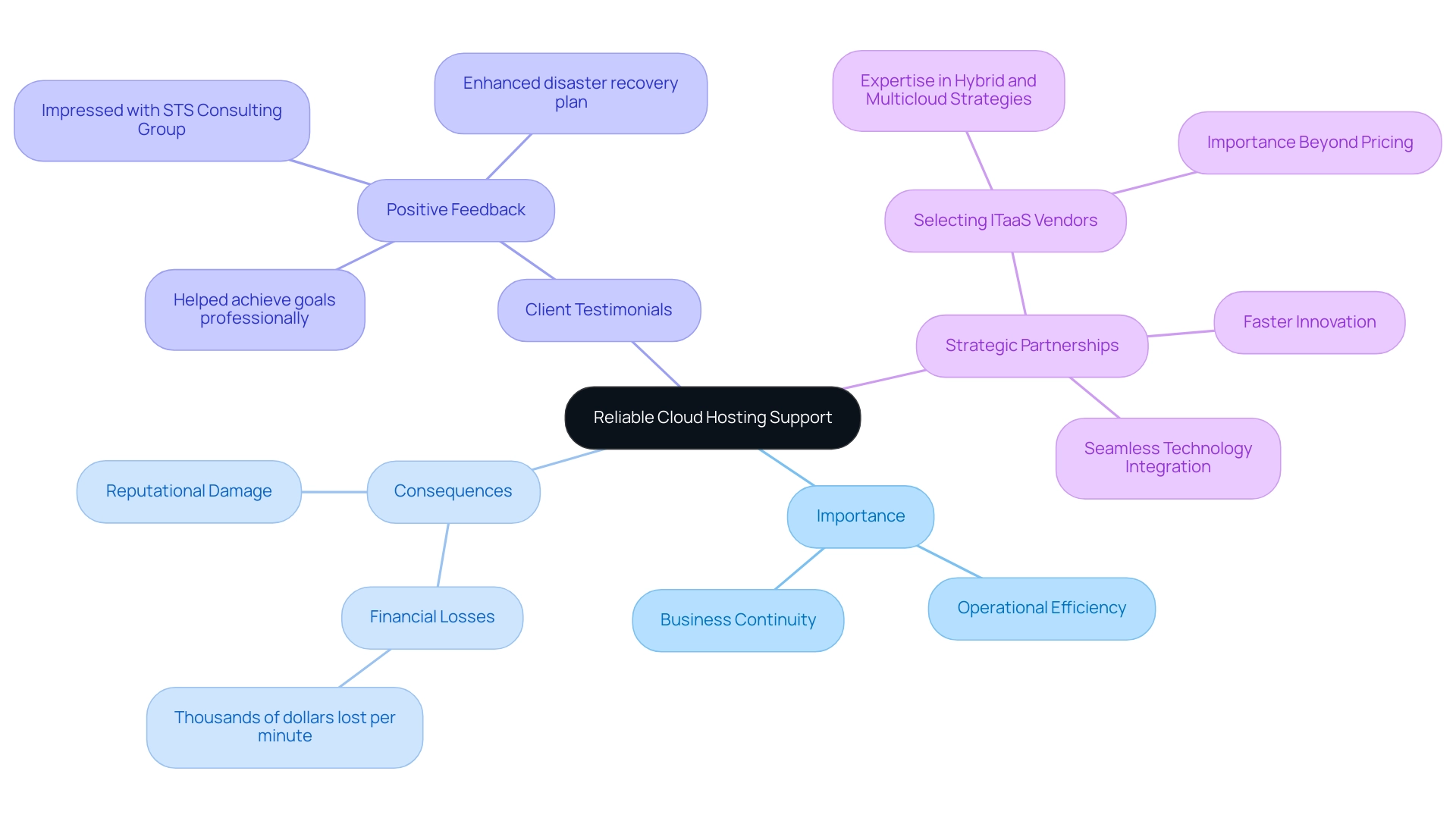
Exploring Different Types of Cloud Hosting Services
Cloud hosting services are categorized into three primary models, each with distinct advantages and considerations for organizations.
- Public Cloud: This model allows resources to be shared among multiple organizations, providing significant cost-effectiveness and scalability.
However, security remains a pertinent concern due to the shared infrastructure. Recent evaluations indicate that 89% of businesses currently utilize multi-platform solutions, underscoring the growing reliance on public environments despite these risks.
-
Private Infrastructure: In contrast, the private infrastructure provides dedicated resources for a single organization. This model enhances security and control, making it particularly suitable for businesses with stringent compliance requirements. As Cody Slingerland observes,
Together, these two areas represent 82% of the world’s computing services, emphasizing the prevalence of private solutions in secure settings.
-
Hybrid Infrastructure: The hybrid infrastructure integrates aspects of both public and private systems, providing organizations the capacity to utilize the advantages of each model. This flexibility allows companies to enhance their strategies based on specific workloads and operational requirements.
Significantly, AWS introduced its initial 16 'Local Zones' in the US in 2022, broadening its accessibility beyond 84 availability zones, which demonstrates the changing environment of online solutions. Furthermore, the assessment of global AI cluster network bandwidth for 2023 suggests the growing integration of AI technologies with hosting services. Grasping these hosting options, especially cloud hosting support, is vital for aligning technological capabilities with organizational objectives, particularly considering the latest trends in security and deployment strategies for 2024.
Moreover, as emphasized in the case study titled "Cloud as a Data Protection Strategy," half of surveyed businesses regard this technology as a vital element of their data protection approach, highlighting the significance of these solutions in disaster recovery and workload migration.
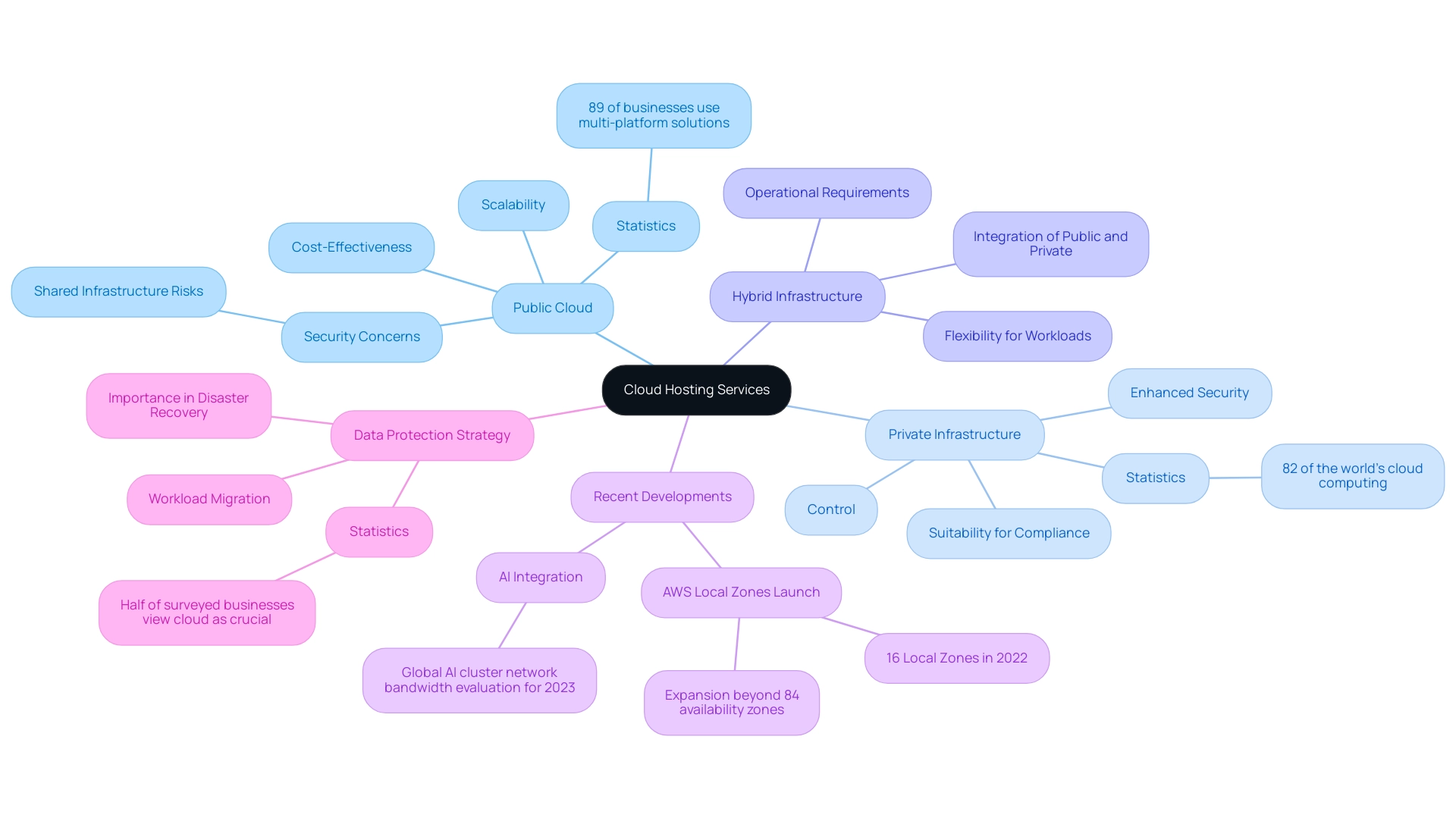
Enhancing Cloud Hosting with Managed Services
Managed solutions are increasingly acknowledged as vital for improving cloud hosting support, offering expert oversight and proactive monitoring of virtual environments. These offerings include managed protection, data backup, and performance enhancement, allowing organizations to focus on their primary strengths while entrusting the intricacies of digital management to experts. As the adoption of remote storage accelerates—with projections indicating that 50% of data will be stored online by 2025—outsourcing these critical functions is becoming a significant growth area for managed service providers (MSPs).
This approach provides substantial benefits, including:
- Improved operational efficiency
- Reduced risk
- Enhanced security
According to Sean Blanton, Director of Content at JumpCloud, "Outsourcing management of online services allows organizations to leverage specialized expertise, ultimately driving innovation and efficiency." Managed solution providers offer advanced instruments and technologies that enhance performance and reliability of the environment.
Notably, a recent survey revealed that half of businesses view online computing as a modern data protection strategy, with many leveraging it for disaster recovery and workload migration. This trend highlights the strategic advantage of integrating managed services and cloud hosting support in achieving long-term success in an increasingly cloud-dependent landscape. Additionally, it's worth noting that global energy consumption by cloud data centers represents 1% of the world’s energy consumption, underscoring the importance of efficient cloud management practices.
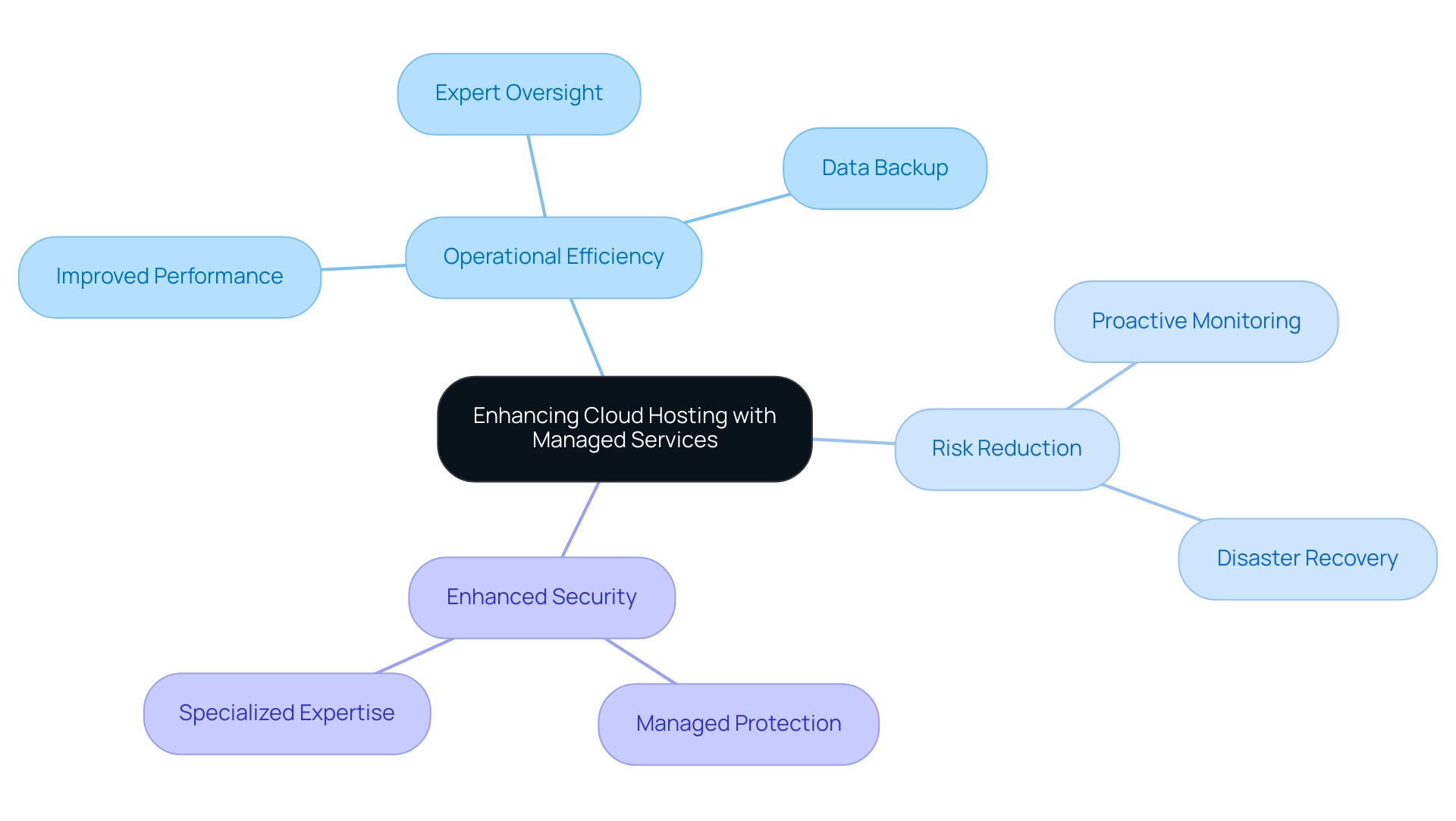
Conclusion
The transition to cloud-based solutions has underscored the critical importance of robust cloud hosting support in ensuring operational success. As organizations navigate the complexities of multi-cloud and hybrid cloud strategies, the necessity for comprehensive support services—encompassing security, performance monitoring, technical assistance, and effective management—has become paramount. Each component plays a vital role in safeguarding sensitive data, maintaining operational continuity, and optimizing cloud infrastructure investments.
With the increasing reliance on cloud environments, the potential risks of downtime and data breaches loom larger than ever. The financial implications of these risks can be staggering, emphasizing the need for reliable support mechanisms that facilitate swift issue resolution and enhance overall service performance. Organizations that prioritize these essential features are better positioned to withstand the challenges of a rapidly evolving technological landscape, ensuring they remain competitive and resilient.
As the future of business operations continues to be shaped by cloud technologies, understanding the significance of effective cloud hosting support will be crucial. By investing in these support services, businesses can not only protect their assets but also unlock the full potential of their cloud investments, driving innovation and achieving strategic objectives in an increasingly data-driven world.




